Media | Articles
7 Tools You Basically Can’t DIY Without
I often think about the bare minimum number of tools required to do a job. Not the ideal tools. Maybe it comes from watching Saturday morning TV shows, where everything took 10 minutes and fit together flawlessly. Watching those projects take shape encouraged me to pick up tools and try my own. But what do you need to just get started?
If we waited until we had a full toolbox to dive in, none of us would ever get anything done. We’d just be sitting around staring at tools. Instead, let’s take a look at the tools that compose the minimum kit required to safely and successfully tackle a project on a daily driver—or at least allow you to do most of a job and then rent or borrow any specialty tools needed for to complete specific tasks. These don’t need to be fancy tools; in fact, this might be a list of items that are best purchased at garage sales, flea markets, or secondhand stores.
Jack and Stands
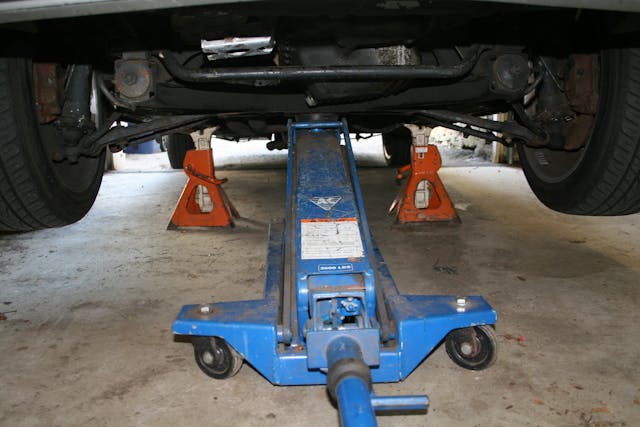
Sure, there are a lot of projects that do not require lifting a vehicle, but sooner or later you’ll need to do it. I’ve done oil changes by putting the front wheels on a curb to get enough clearance to roll under and access the drain plug and oil filter, but that practice doesn’t work in all situations. A jack and stands do. These are the right tools for every job that requires lifting a vehicle. That’s why they are something to get early in your wrenching journey.
Screwdrivers
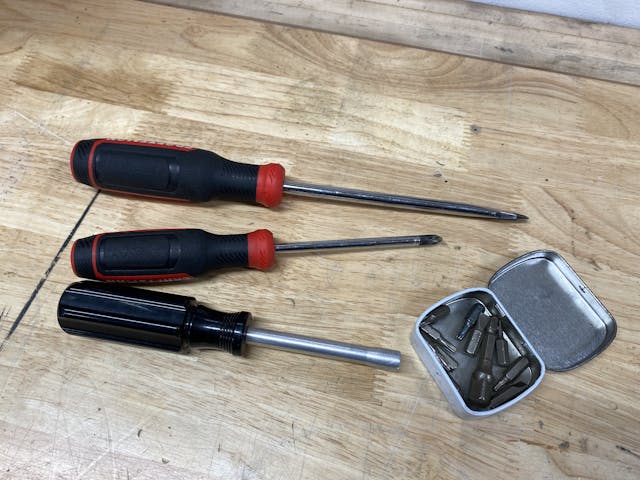
Applied properly, screwdrivers have thousands of uses. We would never tell you to use them improperly, of course, but in a pinch a screwdriver can be used for all sorts of stuff that might very well render them one-time-only tools that, for better or for worse, will get the job done. Screwdrivers also can last a very long time if well taken care of, so adding these to your toolkit early will make for a solid base that rarely needs replacing, which leaves you with funds to buy more specialty tools to grow your kit—or you might just get through a handful of jobs without buying anymore tools at all. That’s a great feeling.
Socket Set

There is a reason every “mechanics toolset” sold in parts stores or home centers has sockets and ratchets as its main component. Ratchets and sockets are a highly efficient method of removing hardware without damaging it. A basic kit is enough to get started, and you can easily add bigger or longer pieces as needed.
Marketplace
Buy and sell classics with confidence
Hammer

You thought I wouldn’t include the hammer? It’s an inarguable necessity. Judicious use will make for a better wrenching experience, but when force is required, a mass at the end of a stick is just the right tool for the job.
Multimeter

“If you can’t fix it with a hammer it’s an electrical problem” is a good joke, because occasionally it’s based in fact. Electrical issues are more common than ever as cars feature more and more sensors and connections. To be a mechanic and not a parts replacer requires diagnostic tools, and diagnosing electrical issues is difficult to do consistently with only your eyes and hands. A good multimeter—and understanding how to read it—is vital.
Drain Pan

Want to do an oil change? You’ll need to catch the used oil somehow. Even a makeshift catch pan is good idea, but many of the drain pans designed for automotive projects are affordable and have features that seem trivial, until you are without them: A pour spout makes emptying the pan easier, and the ability to seal the fluids inside for transport is helpful, too. An open container of used oil is just waiting to be knocked over. Or it’s a magnet for tools or parts or worse, a spark. A good drain pan makes jobs cleaner and safer.
Penetrating Oil

Cars are built from a couple dozen different materials and the vast majority of them are susceptible to corrosion. Penetrating oil helps limit the need for big tools like impact drivers. Is an aerosol can technically a tool? Maybe not, but a good can of penetrating oil should be something you reach for before grabbing tools, so we are going to say it’s a critical part of the toolkit. Besides, if you’re limited on tools, you want to be able to stack the deck in your favor, and that means trying to break fasteners loose using science rather than force.
***
Check out the Hagerty Media homepage so you don’t miss a single story, or better yet, bookmark it. To get our best stories delivered right to your inbox, subscribe to our newsletters.
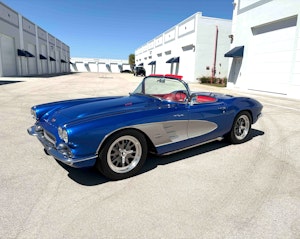


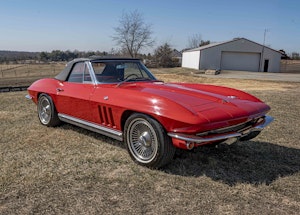

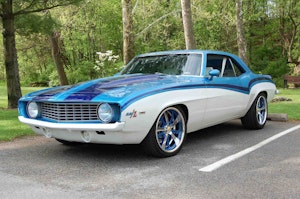










kyle, yet another, to me, enjoyable article. as simple as it is.
i only read the 1st & 4th comments pages, so the following might be redundant. i’ve been going to self-serve auto salvage yards (i call ’em picaparts) for almost 50 years, and have come up with a basic tool kit i keep in the truck bed tool box. i can remove/install almost anything automotive with that collection. other than the drain pan, jack & stands, and multi meter, everything else in this article is included. by chance i forget something under hood or elsewhere, a lot of these tools are low end. still hate to lose anything, but the sting ain’t as bad. and that one carry tool box has turned into 2 tool bags and a socket rack (got spoiled by battery powered tools).
yes, your article tells one of many ways to get a tool collection started. my only other advise – be careful not to get addicted! being a former mechanic, i wanted every tool that would make my job easier & faster, and those tool trucks were anything but cheap. having over $50k in replacement tools, well…
Too many replies to read all of them. Just surprised that no one mentioned the difference in how many of us in the earlier days vs today. A few vs thousands dumping, must make a profound difference.
Neighboring city sprayed the alley with waste oil to kill weeds & keep the dust down. Was latter fined for it. Upon interviewing for a job as mechanic I found out how environmentally unconscious they were compared to the utility company I was working for at the time. Glad I stayed with the utility company retiring after 33 yrs.
My step-uncle had a large farm with lots of machinery. He would drain the oil from the engines and reuse it to lube various parts of the machinery. Most of the country roads back then were dirt. When he bought a new car or truck he would spray used oil into the furthest reaches of the fenders and chassis . The moving parts of his machinery rarely rusted or even rattled. We had never heard of recycling back in the nineteen forties or fifties. Yeah, I am an old guy. I’ve been a half-fast mechanic and gearhead since my teens.
I had a friend back then who drove a bullet-nosed Studebaker we called Old Smoky. He couldn’t afford to pay for a ring and valve job so he just used oil from other people’s oil changes. I believe he paid about five cents a quart for it from local garages. We had a lot of fun in that old Stude; good times indeed.
Steel hammers should not be used on car parts. Only brass or lead.
Really? We needed an article on that? I figured that out back in 1969-71 between the ages of 16-18 without the benefit of the internet. I must have been way ahead of my time, huh?
Y’know … all of the self-righteous commentors snidely poo-pooing the practices of earlier times really need to remember that “times change. All that we know now simply cannot be retroactively applied to what we either knew or thought as “normal” 30, 40, or 50 years ago.
Sorry. That dog, as they say, don’t hunt.
Many of the comments here need to be seen in the context and times from which they are arisen from. And god forbid, with a keen sense of humor.
As another writer above has pointed out, apparently without being noticed, Of course we now know that it is a less than acceptable idea to pour the used petrochemicals necessary for the ongoing operation of the devices we all have become so fond of, and equally as dependent upon into the ground.
But that is relatively recently acquired knowledge, albeit true. Nevertheless, for those of an age before which such knowledge was unheard of, there are a significant number of us here reading for which the practices as so described, were not only commonplace, they were simply not considered at all.
All of the finger-pointing, accusatory, smarter-than-thee snarky commentary submitted heretofore, is equally as egregious and offensive to those being pointed at, as those fingers-pointers are for making such “enlightened” observations.
Those “oil-changing” practices did nothing out of place at the time in which they were carried out.
Nothing. They all occurred prior to such knowledge becoming “common”.
No guilt, No fault.
Any more so than the doctors that had no idea that delivering a baby in the mid 1850’s had any direct correlation to the sudden death of the mother following the birth of her child, between the fact that just prior to that delivery, the good doctor had just hours before, delivered a calf in the field of a neighbour, and then merely washing his hands under the spout of the well pump.
Maybe soap, maybe not.
There was simply no knowledge that there was actually any connection between the two acts.
However, the knowledge that such a connection existed before Dr. Lister suggested such a possibility, and the reformed practices for delivery which followed that discovery never sought to look back and make those earlier, and through no fault of their own, ignorant doctors, appear as “stupid” or otherwise indolent.
As another commentator above has said, it is just unacceptable to view the practices of the ignorant past through the educated lens of the newly discovered.
It is the adoption and employment of such views that sits at the core of many of our current societal deficiencies, in turn lending themselves to the intentional decline and inevitable left-leaning destruction of Western civilization.
The stories left above were, in my interpretation, left only to be remembered as humorous anecdotes of occurrences so witnessed, and viewed in just such a light. They were not meant to become targets of ridicule or scorn by those too young to know any better.
Such fingers should be pointed back at themselves for being so criminally humorless.
And, I might add, as ignorant as those doctors delivering the neighbours calves.
I may have missed it in the disposal of used oil discussion (I’ve used my own bad habits in the distant past) but a word of caution on the hammers. I believe the hammers pictured all have hardened steel heads with the appropriate safety labels. I’ve seen soft headed hammers used around drilled pier rigs but a great deal of caution and safety glasses should be used with hardened steel hammers used on hardened steel parts. The operator or the peanut gallery can be badly injured by steel chips flying from the contact surfaces. I cringed a hair just looking at the collection. We don’t want any “dead eye” car mechanics.